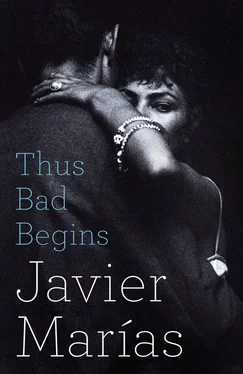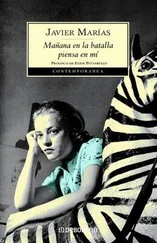This wasn’t the case with Van Vechten of course, because he didn’t even know about the resentment and suspicions harboured by his friend of so many years, still less that his friend had embarked on a secret and potentially hazardous investigation into possible facts about his past — as secret as it was erratic, as befits an amateur — using a young employee who had no idea what he was looking for and was, therefore, very much working in the dark. That night, he had helped spontaneously and disinterestedly, as would any doctor, and he would doubtless have done the same for anyone, even a complete stranger who had locked herself in a bathroom with a razor — Vic Damone’s Asian girlfriend, for example, had Van Vechten been at that party in 1961 — and, it goes without saying, the wife of a great friend of his, a wife whom he occasionally fucked, because, given what I’d seen at the Sanctuary of Darmstadt, that was the only correct verb to use, there was no lying with, no making love to, they weren’t even lovers, or so it seemed to me, or only technically speaking. Muriel knew nothing of all that, because, among other reasons, he didn’t care what Beatriz got up to, but what seemed so extraordinary was that he should care so much about losing her or saving her, for he had seemed genuinely anguished, distraught, at times looking as deathly pale or even more so than the hotel manager, Señor Gómez-Antigüedad, as if he couldn’t live without that woman who so infuriated him and whom he made so very unhappy, even haring like a mad thing down Calle Velázquez, he who never ran anywhere. And because of these new or renewed feelings of gratitude towards Van Vechten, he halted my investigation: the result of the Doctor’s perfectly routine intervention at the Hotel Wellington was that, two days later, when Beatriz was in hospital, still under observation and medical care, and during one of the brief periods when Muriel was not at her bedside and had come home to rest a little, his reward to the Doctor was to cancel all his previous orders to me, to cancel my mission, if that isn’t too grand a term for it.
‘Listen, young De Vere, I have something to say to you.’ He was once again lying full-length on the floor in the living room, and whenever he did this, I was more and more convinced that it was his way of avoiding having to look me straight in the eye, a way of preventing me from accurately reading the expression on his face, which is difficult when someone is not on the same level as you, that’s why kings always insist on having an elevated throne and why the same effect is still sought by the rich and powerful, many of whom wear lifts in their shoes or a wig. And although he opted to descend to a lower level, it provided him with a similar degree of opacity. ‘You saw how well the Doctor behaved a couple of nights ago. And that isn’t the first favour I owe him either, he’s done me a number of favours over the years; and although he couldn’t save the child, he did everything in his power to do so. He did save Beatriz, and it isn’t right that I should repay him with suspicions and machinations, by asking someone to spy on him. It doesn’t matter if what I was told is true. Even if it were, other things are more important, namely, our friendship and what he has done for me and my family in the past. I would be an ingrate, an avenger, a fanatic, if I were to withdraw my friendship over something that doesn’t even concern me, when he has done so many good things for the people who do concern me.’ — ‘Perhaps one of those good things is that he distracts you and occasionally rids you of Beatriz’s presence,’ I thought suddenly, ‘and you know all about it, Muriel, and may even have encouraged it’; in my thoughts I addressed him as tú , for the mind tends to be less formal than the tongue. — ‘What happened the night before last has forced me to remember and reflect. So just leave it be, forget all about it, ignore my orders, there’s no need for you to take him to any more nightclubs, still less to draw him out and observe him, just drop the whole thing. If he did once do something vile, that’s a matter for those he harmed, it’s not up to me to investigate or make some decision. It’s not even my business. I allowed myself to be carried away by a mere rumour.’ I had wanted to interrupt him several sentences ago, but realized this was not yet the right moment, that he had paused only in order to continue or to finish what he had to say. He again fixed his eye on the Casanova painting (on that possibly one-eyed horseman listening to his possible victims outside the painting, where the viewer was standing, all of them pleading: ‘Remember us’), although determining its exact trajectory belonged in the realm of divination. And he added: ‘In fact, anything you’re told, anything you didn’t personally witness, is pure rumour, however wrapped up in oaths it comes, all swearing the story to be true. And we can’t spend our lives listening to rumours, still less acting in accordance with their many fluctuations. When you give that up, when you give up trying to know what you cannot know, perhaps, to paraphrase Shakespeare, perhaps that is when bad begins, but, on the other hand, worse remains behind.’
It seemed to me now that he was about to fall silent and that I could finally ask him the question that was plaguing me. However, the mention of Shakespeare brought to mind one of the lines Rico had recited so theatrically, one arm outstretched: ‘Upon my tongues continual slanders ride, the which in every language I pronounce, stuffing the ears of men with false reports …’ Perhaps Muriel really had been listening to what the Professor was saying and had started there and then to ponder the injustice of believing what he had been told about the Doctor. If so, it hadn’t been enough to put a brake on his suspicions and his unease, for he had nevertheless decided to investigate or, rather, sound out the situation.
‘You said, “Although he couldn’t save the child”? What child? I don’t know what you’re talking about, Eduardo.’ That was the question that had been burning inside me ever since I heard Muriel’s passing comment, made as if he assumed I would know all about whatever it was. Then suddenly I twigged, almost at the same time as he — with a look of genuine surprise, not to say astonishment — pointed at the photo, on full view, of the young Beatriz holding a child of about two in her arms and looking not at him, but to her right: the boy in the little fur coat and the white balaclava with a large pompom on top, the boy with the delicate features who was also looking intently away, but to his left. There was the photo framed and on display and about which I had never asked. I’d asked very little in fact (despite my tendency to spy, I was basically a reasonably discreet young man), ever since Muriel had abruptly brushed aside my inquiry about the origin and reason for his eyepatch.
‘Who do you think? Javier, of course, our firstborn, the one who died. There he is. I thought you knew, indeed, how could you possibly not know? How long have you been working here now?’
‘I don’t know if I realized or not, Eduardo, but you hardly ever tell me anything. You told me off when I asked about your missing eye. And since you were determined not to tell me your suspicions about the Doctor, I’m completely in the dark about that too. I also have no idea what your wife did to cause you to be so unpleasant to her, because, you know, you don’t always hide your feelings in my presence. I’m not asking that question now, certainly not, it’s none of my business, but I don’t see why it should surprise you that I don’t know about everything else. No one has ever told me anything, and I only ask what is strictly necessary. Because of that, I still don’t even know why Beatriz tried to kill herself, and I was, after all, the one who saw her go into the hotel. I’m also aware that there might be no easy answer to that.’
Читать дальше












